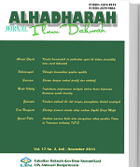Dinamika Komunikasi Pendidikan pada Era Disrupsi
DOI:
https://doi.org/10.18592/alhadharah.v19i2.3896Keywords:
education, disruption, learner, teacher.Abstract
Progress of the era, also known as the era of disruption, is largely human, one of which is education. This change certainly has an impact felt by humans as it is increasingly individualistic and increasingly busy responding to the times. Changes in the world of online education or whatever the government intends to do must certainly accommodate rapid changes in the world that is currently based on information technology. This article uses the type of library research that is a study carried out through data collection related to today's education, data collection or scientific papers that aim to conduct critical and in-depth studies by searching relevant library materials. The results of this study found that students need to be learners who are always hungry for information and become learners who understand and have a variety of approaches such as design thinking (a way of solving problems focused on people centered. Teachers must also have strong scientific competence and have soft skills in the form of critical thinking, creative, communicative, and able to collaborate. n addition it must also be able to spread inspiration for students, be able to be friends with students and of course must be an example.References
Baharun, Hasan. 2017. Pengembangan Kurikulum : Teori Dan Praktik (Konsep, Prinsip, Model, Pendekatan, Dan Langkah-Langkah Pengembangan Kurikulum PAI). Yogyakarta: Cantrik Pustaka.
Bakhtiar, Sony. 2018. “Kebijakan Pendidikan Kosmopolitan Muhammadiyah Di Tengah Tantangan Era Disrupsi.” The Journal of Society & Media 3 (1).
Dimyati, Muhammad. 2018. “Tantangan Riset Di Era Disrupsi Dan Globalisasi.” Semarang: Direktorat Jenderal Penguatan Riset dan Pengembangan KEMENRISTEK DIKTI.
Dotsika, Fefie, and Andrew Watkins. 2017. “Identifying Potentially Disruptive Trends by Means of Keyword Network Analyisis.” Technological Forecasting and Social Change 119: 114–27.
Efendi, Neng Marlina. 2018. “Revolusi Pembelajaran Berbasis Digital (Penggunaan Animasi Digital Pada Start Up Sebagai Metode Pembelajaran Siswa Belajar Aktif).” Habitus : Jurnal Pendidikan, Sosiologi Dan Antropologi 2 (2): 173–82.
Khatibah. 2011. “Penelitian Kepustakaan.” Jurnal Iqra 05 (01): 36–39.
Khobir, Abdul. 2009. “Pendidikan Agama Islam Di Era Globalisasi.” Edukasia Islamika 7 (1).
Leksono, Ninok. 2018. “Pembangunan, Pluralitas, Dan Era Disrupsi.” Yogyakarta: Universitas Sanatha Dharma.
Machali, Imam. 2014. “Kebijakan Perubahan Kurikulum 2013 Dalam Menyongsong Indonesia Emas Tahun 2045.” Jurnal Pendidikan Islam 3 (1): 71–94.
Ngafifi, Muhammad. 2014. “Kemajuan Teknologi Dan Pola Hidup Manusia Dalam Perspektif Sosial Budaya.” Jurnal Pembangunan Pendidikan : Fondasi Dan Aplikasi 2 (1): 33–47.
Nurkholis. 2013. “Pendidikan Dalam Upaya Memajukan Teknologi.” Jurnal Kependidikan 1 (1): 24–44.
Pranggono, Bambang. 2001. “Pendidikan Tinggi Di Era Digital Dan Tantangan Bagi UNISBA.” Mimbar XV11 (1): 1–19.
Sukmana, Yoga. 2019. “Hasrat Ruangguru Menjadi Unicorn, Startup Bernilai 1 Miliar Dollar AS.” Https://Ekonomi.Kompas.Com/Read/. 2019. https://ekonomi.kompas.com/read/2019/02/04/110200326/hasrat-ruangguru-menjadi-unicorn-startup-bernilai-1-miliar-dollar-as.
Undang-Undang Nomor 20 Tahun 2003 Tentang Sistem Pendidikan Nasional. 2003. Sekretariat Negara RI.
Zed, Mestika. 2008. Metode Penelitian Kepustakaan. Jakarta: Yayasan Obor Indonesia.
Downloads
Published
How to Cite
Issue
Section
License
Authors retain copyright and grant the journal the right of first publication, with the work simultaneously licensed under the Creative Commons Attribution-NonCommercial 4.0 International Public License (CC BY-NC 4.0). This license allows reusers to distribute, remix, adapt, and build upon the material in any medium or format for noncommercial purposes only, provided that proper attribution is given to the original creator.







